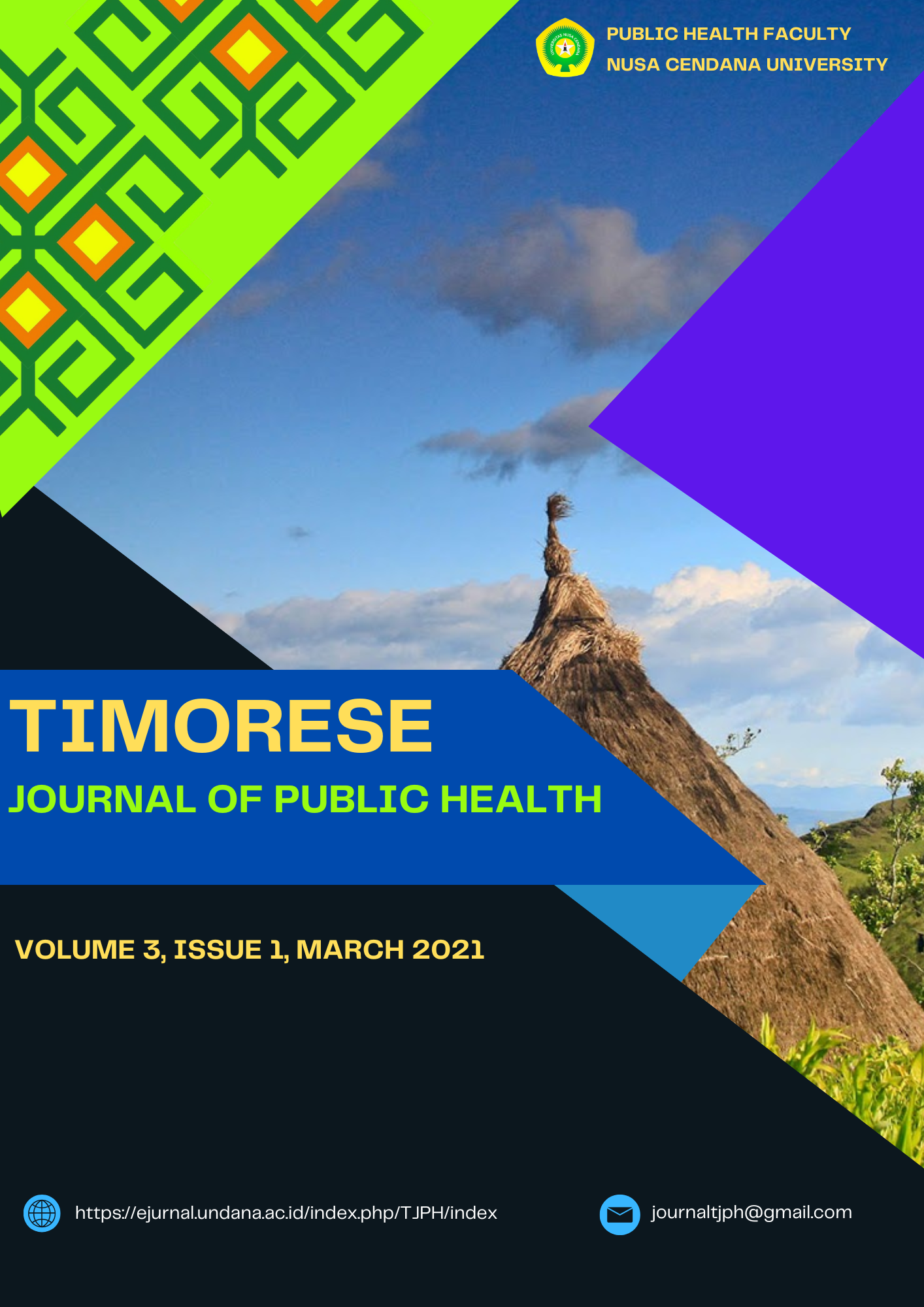Risk Factors for Stunting at The Lurasik Health Center
Main Article Content
Abstract
Stunting is a condition of failure to thrive in children under five years old (infants under five years old) due to chronic malnutrition so that the child is too short for his age. This study aims to determine the factors that influence the incidence of stunting in the Lurasik Health Center Work area, North Biboki District, North Central Timor Regency. This type of research is an analytic survey with a case-control study design. The sample of the study was 148 toddlers who were divided into 74 case samples and 74 control samples. The use of data analysis was univariate, bivariate, and multivariate analysis with statistical tests of simple logistic regression and multiple logistic regression. The results of this study indicate that the factor which influences stunting was a history of infectious disease (p= 0.008), energy adequacy level (p= 0.000), protein adequacy level (p = 0.000), history of exclusive breastfeeding (p= 0.000), level of parental income (p= 0.031), while the factor that did not affect the incidence of stunting was level of mother’s work (p= 0.869). The dominant factor which most influence the stunting was the history of gave breastfeeding, the level of energy sufficiency and the level of protein adequacy. It is hoped that with the factors that influence the incidence of stunting in toddlers in the working area of the Lurasik Health Center, it can add information to the public so that stunting prevention is further improved
Downloads
Article Details
References
2. TNP2K. 100 Priority Districts/Cities for Stunting Interventions: National Team for the Acceleration of Poverty Reduction. Jakarta [Internet]. 2017;2(c):287. Available from: http://www.tnp2k.go.id/images/uploads/downloads/Binder_Volume1.pdf
3. TTU Health Office Profile. TTU District Health Office Profile, 2018 -2019.
4. Lurasik Health Center Profile. Profile of the Lurasik Health Center. 2020.
5. Intje P, Theresia L, Ivon P, Robertha K. Mentoring 25 Indicators of Accelerating Stunting Reduction in Southwest Sumba Regency (SBD) East Nusa Tenggara Province. J Pengabdi pada Masy Kepul Lahan Kering [Internet]. 2020;14. Available from: https://doi.org/10.51556/jpkmkelaker.v2i1.149
6. Reza R, Putri SVC. Effect of Exclusive Breastfeeding and Early MP ASI Against Stunting in Toddlers. Semin Nas Has Ris dan Pengabdi Ke-III (SNHRP-III 2021) [Internet]. 2021; Available from: https://repositori.usu.ac.id/bitstream/handle/123456789/28474/151000015.pdf?sequence=1&isAllowed=y
7. Angkat AH. Infectious Diseases and Practice of Complementary Feeding on the Incidence of Stunting in Children aged 12-36 Months in Simpang Kiri District, Subulussalam City. J Dunia Gizi [Internet]. 2018;1(1):52. Available from: http://ejournal.helvetia.ac.id/jdg
8. Desyanti C, Nindya TS. The Relations Between Diarrheal Disease History and Hygiene Practices with Stunting Incidences Among Children Aged 24-59 Months in The Work Area of Puskesmas Simolawang, Surabaya. Amerta Nutr [Internet]. 2017;1(3):243. Available from: https://e-journal.unair.ac.id/AMNT/article/download/6251/3867
9. Pacheco Cipriano, Intje P, Sinaga Mindo Sinaga2. Health, Food Consumption, Social Economy, and Stunting Inci- Dency in Timor Leste. J Kesehat Masy [Internet]. 2017; Available from: http://journal.unnes.ac.id/nju/index.php/kema
10. Lidia F, Ritawani E, Mentiana Y. Relationship of Energy Intake with Event Stunting in Toddlers 2-5 Years Old in Pekanbaru City. J Endur Kaji Ilm Probl Kesehat [Internet]. 2020;5(3) Oktob. Available from: http://ejournal.kopertis10.or.id/index.php/endurance
11. Oktavia P. The Influence of Energy, Protein, and Zinc Consumption Habits on Stunting Incidents in School-Age Children in Sd Negeri 010150, Talawi District, Batu Bara Regency in 2017 [Internet]. UNIVERSITAS SUMATERA UTARA MEDAN; 2017. Available from: http://repositori.usu.ac.id/handle/123456789/2888
12. Sugiyanto S, Sumarlan S. Analysis of Factors Associated with Stunting in Toddlers Age 25-60 Months. Perintis’s Heal J [Internet]. 2021;7(2):9–20. Available from: https://jurnal.stikesperintis.ac.id/index.php/JKP
13. Kemenkes. Infodatin-Asi [Internet]. Millennium Challenge Account - Indonesia. 2014. p. 1–2. Available from: https://pusdatin.kemkes.go.id/download.php?file=download/pusdatin/infodatin/infodatin-asi.pdf
14. Khoirun N, Nadhiroh Siti Rahayu. Factors Associated with Stunting Incidents in Toddlers. Media Gizi Indones [Internet]. 2015;Vol. 10, N:13–19. Available from: https://e-journal.unair.ac.id/index.php/MGI/article/download/3117/2264
15. Picauly Intje, Djita Hege. The Relationship of Exclusive Breastfeeding Patterns and Nutritional Intake of Mp-Asi With Nutritional Status of Children. J PAZIH_PERGIZI PANGAN DPD NTT [Internet]. 2021; Available from: https://pergizipanganntt.id/ejpazih/index.php/filejurnal/article/view/132
16. Lobo WI, Talahatu AH, Riwu RR. Determinants of Stunting Incidence in Toddlers in the Working Area of Alak Health Center, Kupang City. Media Kesehat Masy [Internet]. 2019;1(2):59–67. Available from: https://ejurnal.undana.ac.id/MKM
17. Cahyono Firmanu, Stefanus M, Picauly Intje. Stunting determinants of under five years children in various ecosystem zones in Kupang. J Gizi Pangan [Internet]. 2016;Volume 11. Available from: https://journal.ipb.ac.id/index.php/jgizipangan/article/view/13164/9916
18. Rizki I. Relationship Between Family Income, Birth Weight and Length of Birth With Stunting for toddlers 24-59 months in Bangkalan. Manaj Kesehat [Internet]. 2017;Vol. 3 No.:1–14. Available from: https://media.neliti.com/media/publications/258449-hubungan-pendapatan-keluarga-berat-lahir-669eb155.pdf
19. Ibrahim IA, Faramita R. The relationship between family socio-economic factors and the incidence of stunting in children aged 24-59 months in the working area of the Barombong Health Center Makassar City in 2014. Al-Sihah Public Heal Sci J. 2015;7(1):63–75.
20. Ngaisyah RD. Socio-Economic Relationship With Stunting Incidents in Toddlers in Kanigoro Village, Saptosari Gunung Kidul. J Med Respati [Internet]. 2015;10(4):65–70. Available from: http://medika.respati.ac.id/index.php/Medika/article/download/105/101

